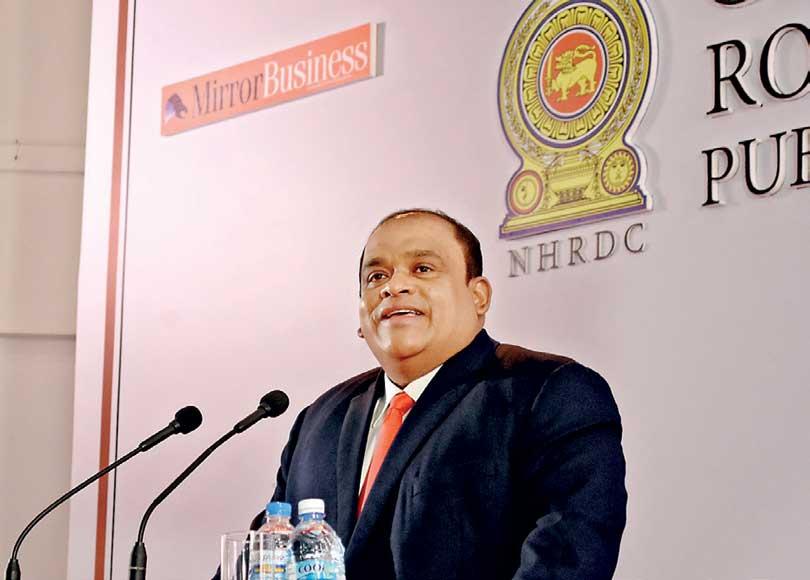25 Sep 2019 - {{hitsCtrl.values.hits}}

Dhammika Perera
Pic by Nimalsiri Edirisinghe
By Nishel Fernando
Business tycoon and Vallibel One PLC Chairman Dhammika Perera yesterday laid out a brand-new tax structure with tax cuts and incentives to guide Sri Lanka to the developed nation territory by 2030, as the current tax regime has failed to attract the required investments during the past five years for the economy to take off and avoid the so-called middle-income trap.
Perera yesterday unveiled a comprehensive economic growth strategy and an action plan for Sri Lanka to increase its GDP per capita income from the current US$4,000 to US$12,000 by 2030, as he delivered a special lecture on the topic ‘Changing role of the public servant’, which was jointly organised by the National Human Resources Development Council of Sri Lanka (NHRDC), Sri Lanka Institute of Tourism and Hotel Management and Association of Public Finance Accountants of Sri Lanka, the public sector wing of CA Sri Lanka.
“The lack of investments into the country at present is primarily due to the incorrect tax rates as our current rates tax investors higher than our competitors, thereby discouraging investments into the country.
Therefore, it is required to maintain a tax rate at the revenue maximising point in order to attract the highest possible investments into the country,” he said. Perera expressed his confidence that the action plan proposed by him would generate 200,000 new jobs per annum by 2025, by attracting US$7 billion local investments and US$7 billion foreign investments
per annum.
Volume One of Perera’s action plan targets 21 ministries, highlighting 900 focal points, which require around 20,000 measures to be implemented.
Perera has proposed zero percent VAT and zero percent dividend tax for 25 years for several priority sectors, including education, information service activities, human health activities, air transport and motor vehicle manufacturing.
Although the direct tax revenue increased during past few years, reaching Rs.2.48 trillion in 2018, he pointed out that Rs.2.4 trillion was incurred as an additional payment, due to rupee depreciation, to make foreign borrowings of Rs.5.96 trillion.
“Therefore, it is essential to bring in investments regardless of the direct tax revenue to halt the rupee depreciation beyond two to three percent,”
Perera outlined.
As the continued policy inconstancy hinders the investor confidence, he stressed at least 25-year guaranteed tax benefits, in agreement with the Board of Investment, are essential to showcase the competitive advantage to the investor in investing in Sri Lanka.
He further proposed to reduce the current corporate tax rate to 12 percent for new ventures and to provide the reduced rate for 25 years for all sectors in the Western Province.
In order to support employment generation in rural areas, it was also recommended to grant a discount of 80 percent for all provinces, excluding the Western Province, thereby charging an effective rate of 2.4 percent.
However, he opined that the present corporate tax rate must be maintained on financial services (Barring insurance and pension funding), wholesale trade (Except motor and motor vehicles), telecommunication, tobacco product manufacturing and gambling and betting activities while reducingthe dividend tax and capital gains tax to zero percent.
Similar to the United States, Perera insisted that Sri Lanka must focus on monthly job-generation data to make the required policy interventions to support economic growth throughout the year, instead of waiting for quarterly GDP data.
He noted that a one percent decline in the unemployment rate leads to a three percent increase in GDP, as per
Okun’s law.
According to the World Bank, Sri Lanka needs to generate 62,400 new employment opportunities per annum to merely maintain the current economy.
Perera suggested that the government should consider creating a mobile application to collect unemployment data instantly and tackle unemployment in particular areas.
While stressing that education is the most crucial element to escape the middle-income trap for any country, Perera presented a detailed action plan to increase graduates and skilled labours in the labour force to be employed in productive sectors in the future economy.
It was proposed to allocate an additional budget of Rs.200 billion with 10 percent increment for primary, university, technical and vocational education, targeting to increase state university graduates by 2.38 times to 60,000, local private university graduates by 7.1 times to 105,228 and to reduce the unskilled labour contribution to 10 percent from labour force by 2025.
The action plan envisages to set up 50 schools by branching out popular schools throughout the country with a capacity of 60,000 students, while increasing the total capacity to 300,000 students.
In order to achieve 50 percent university degree holders from total student population per annum, Perera has proposed tax breaks to set up private universities, excluding medical colleges and to introduce Rs.1.2 million interest-free loans for every student who passes the advanced Level examination, to enrol in private universities.
In terms of national security, he weighed on utilising digital and artificial intelligent tools to enhance the security measures.
“Sri Lanka’s security policy is to secure the independence, sovereignty, territorial integrity and safety of the citizens,” he said.
18 Apr 2024 40 minute ago
18 Apr 2024 1 hours ago
18 Apr 2024 3 hours ago
18 Apr 2024 3 hours ago
18 Apr 2024 4 hours ago